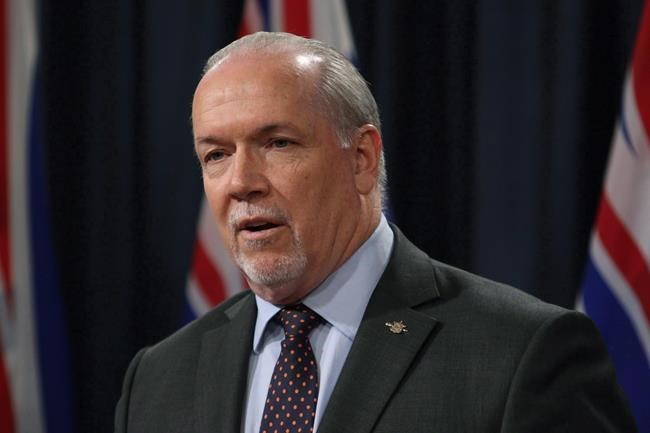 Background information recently released about B.C.’s Jan. 30 announcement that it was planning to restrict oil movements through the province shed some light on what’s turned out to be the most important move the NDP government has made to date.
Background information recently released about B.C.’s Jan. 30 announcement that it was planning to restrict oil movements through the province shed some light on what’s turned out to be the most important move the NDP government has made to date.
For all the decisions they’ve made, it’s the national pipeline fight that will define this government. The Trans Mountain expansion project was just a sore point between B.C. and Alberta and Ottawa up to Jan. 30. But after the Environment Ministry’s news release went out, the difference turned into an economic war.
A response to a freedom-of-information request about the release that started this showdown included a revelation. Premier John Horgan wasn’t the only person surprised by the vehemence of Alberta’s response. His entire government appears to have been blindsided by Premier Rachel Notley’s instant reaction.
Some officials, no doubt, knew what they were starting. But there’s not much on the record indicating B.C. officials anticipated that they would be sparking a full-fledged crisis.
> More on Trans Mountain at timescolonist.com
That point is made indirectly in some questions and answers that were put together by government officials “for internal use only” ahead of the public announcement. It’s a common practice to anticipate all the questions that might arise from a policy decision and distribute agreed-upon answers internally so that all officials are on the same page.
The announcement was made via a routine news release, rather than a news conference. The bombshell was in the fifth and last point. The government was proposing new spill regulations and wanted feedback on five areas, including “restrictions on the increase of diluted bitumen transportation until the behaviour of spilled bitumen can be better understood.”
Nineteen Q&As were distributed internally, and not one of them raised the crucial point: What would Alberta think of this move?
That reaction turned out to be crucial. Notley instantly called an emergency cabinet meeting, condemned the idea of restricting the flow and has been raising the stakes ever since. Horgan, who was overseas when the announcement was made, returned a day or so later and said he was surprised and caught off guard by Alberta’s response. Notley suspended some low-level talks about a joint electricity deal. The wine boycott was announced, then suspended when B.C. backed down and promised to submit “Point Five” to the courts for a jurisdictional ruling. Horgan maintained his air of mystified bafflement at what all the fuss was about for weeks.
But the fight flared up repeatedly. It has now reached the point where B.C. is suing Alberta over its legislated threat to curtail refined fuel shipments in order to punish B.C. citizens and force the government to retreat.
Considering how incendiary Point Five became, it’s odd how the internal Q&As lowballed the potential impact. Two examples:
• How long would a potential prohibition last? As long as it took a panel to study spill impacts. It could be lifted once government is satisfied that heavy oils can be moved safely and cleaned up.
• Are you confident the panel will find solutions. What if they don’t? We are confident there will be findings applicable to B.C. within two years. They’d be the basis for further regulations on spills and “a potential prohibition would be repealed once those measures were in place.”
Although Point Five was downplayed and couched in reassuring terms (“it could be lifted”) the story took off in short order. Environment Minister George Heyman did more than 20 media interviews soon after it rolled out.
He and Horgan have done many more since then. Nothing they’ve said has eased the growing animosity.
They campaigned on a promise to stop the pipeline dead. Now they want to restrict shipments for a couple of years while a study proceeds. It’s odd how little thought they gave (on paper, at least) to the fact that, in Alberta, that sounds like exactly the same thing.
Just So You Know: There’s one amusing side note. The first question in the Q&A is the one that’s been asked incessantly by everyone for months: “Are these regulations aimed at stopping the Kinder Morgan pipeline?”
The answer is a three-sentence non-answer, proving that government can dodge its own questions just as well as it can those from reporters.



